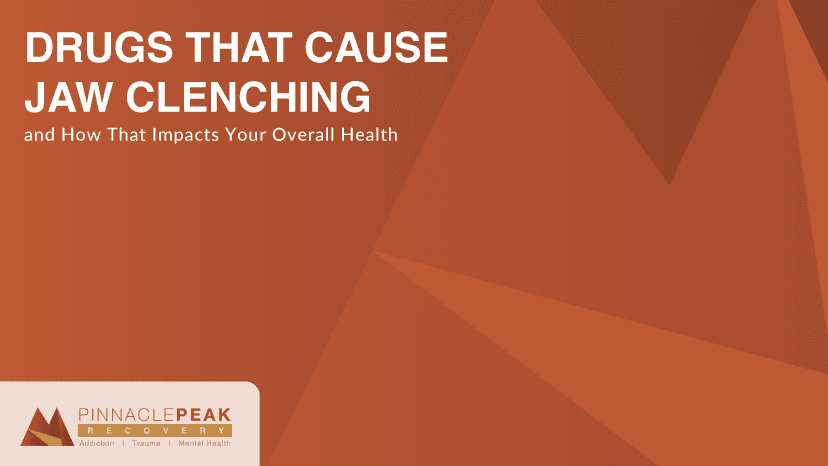Your life has recently become more stressful than normal. Work has been a bit more hectic, your car is making a fun new sound, and recently you’ve started waking up with face pain and headaches. Could all of these things be related?
Over 40% of adults in Arizona have reported symptoms of anxiety or depression within the last year. Both mental illnesses and substance use have many symptoms that aren’t often spoken about. One of these symptoms is jaw clenching.
Is jaw clenching a bad thing? How can it impact you and your teeth? We get questions like these more often than you might think here at Pinnacle Peak Recovery because jaw clenching can be sometimes linked with substance use. We believe in making sure our community is well-informed about all aspects of substance use, even the less harmful parts. With our team of expert-level physicians, we aren’t afraid to share our knowledge to better educate about substance use. Today we’re going to look at drugs that cause jaw clenching, if it can be bad for you, and the steps you can take to address it.
Why Am I Suddenly Clenching My Jaw All the Time?
Jaw clenching, otherwise known as bruxism, can happen both consciously and unconsciously. It occurs when you grind or clench your teeth and it can happen any time of day, from when you first wake up to even when you’re fast asleep. Some people aren’t even aware of the fact that they have bruxism until they start experiencing side effects.
If you haven’t noticed yourself consciously clenching your jaw, but you think you might be, keep an eye out for the following symptoms:
- Chipped or cracked teeth
- Face pain
- Locking or dislocating of the jaw
- Enamel erosion
- Tension in the jaw and other facial muscles
- Headaches
- An increase in teeth sensitivity
- Tongue indentations
- Popping or clicking sounds from your jaw joints
- Damage to the inside of your cheeks
- New flat areas on the bite surface of your teeth
Is Jaw Clenching a Sign of a Medical Condition?
Jaw clenching is usually a side effect of minor things, such as stress and aggression. It more commonly occurs when someone might be nervous or have high tension, usually in a negative way. There are some instances, however, that have shown a connection between snoring, sleep apnoea, and teeth grinding. If you're experiencing other troubles such as difficulty sleeping, you could look into this as a potential cause.
Overall, jaw clenching is not usually a sign of something more concerning, however, if it is bothering you in any way, it’s okay to seek out your doctor or even dentist in order to find more solutions.

What Drugs Are the Most Common Cause of Jaw Clenching?
Beyond stress and high anxiety situations, there are drugs that have been linked with jaw clenching, too. The most common substances that have been tied to it are SSRIs (a form of antidepressant), alcohol, ecstasy, and cocaine.
These substances can cause jaw clenching for a variety of reasons. Most of these substances are known to have side effects such as anxiety and depression, especially when it comes to long-term use of the substance. Both anxiety and depression can lead to jaw clenching in the right circumstances.
Another factor to consider is the high energy levels that are given by some of these substances, which can also contribute to jaw clenching.
Why Do Adderall and Antidepressants Cause Jaw Stretch/Clenching?
Why does jaw clenching occur when it's tied to medication use? Well, for those who are on an SSRI, you might be wondering, “Why did this cause jaw clenching in the first place?”
Studies have shown that antidepressants and the way they interact with our brain chemistry can sometimes cause the side effect of jaw clenching. While this isn’t always the case, and some SSRIs are more prone to it than others, it can occur.
If you’re experiencing any negative or unwanted side effects from your antidepressants or other medications, make sure you bring it up with your doctor. You do not have to power through unwanted side effects if you haven’t explored your other options, yet.
How to Clench Your Jaw Less Often
If you’ve been trying to manage jaw clenching, there are ways to work on it at home. One of the simplest solutions is to invest in a mouthguard. You can wear this at night or any time of the day if you’re concerned about jaw clenching. A mouthguard will help protect your teeth from the damaging effects of teeth grinding.
In some uncommon cases, jaw clenching can be caused by neurotransmitters misfiring. If you’re taking an SSRI or other form of antidepressant and are experiencing jaw clenching, it could be due to the neurotransmitters. Talk with your doctor about potentially swapping medications to see if it might help.
Other small steps you can take to address jaw clenching include trying to find ways to be more aware of it, or learning how to make sure your tongue and teeth are resting properly in your mouth. This can help potentially reduce the stress you put on your jaw and teeth when you bite down.

How to Address Drug Use That Causes Jaw Clenching in Arizona
If you or a loved one is managing a substance use disorder and you’re looking for help, Pinnacle Peak Recovery has got you covered. We know how impactful some of the side effects of substance use can be, and we’re prepared to help you take the steps you need away from substance use and toward recovery.
Many of the side effects that can occur from long-term or heavy substance use can be addressed, but it’s important to address them alongside recovery. Jaw clenching and its after-effects can be worked on, especially with the tools and skills you’ll learn during your journey with our Pinnacle Peak team.
If you’d like to learn more about our programs, our support network, the evidence-based practices we implement, or more – just give us a call anytime at (866) 377-4761. Our Pinnacle Peak team wants to see you achieve long-term recovery. We’re here to help whenever you are ready.
If Your Loved One Suffering From Jaw Clenching?
Call Us Today To Learn How You Can Help Them!
FAQs
What recreational drugs cause jaw clenching?
It’s not uncommon for substances like ecstasy and cocaine to have the side effect of jaw clenching.
What vitamin stops jaw clenching?
There are currently no specific medications or supplements that can fully prevent or stop jaw clenching. Other solutions such as a mouthguard can be beneficial, however.

